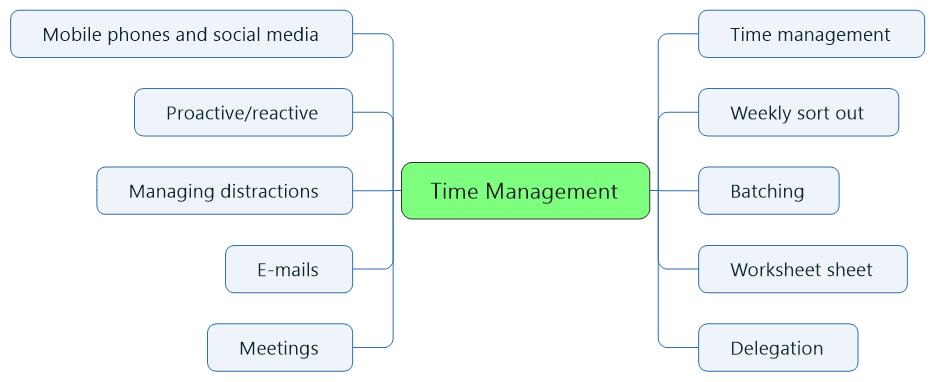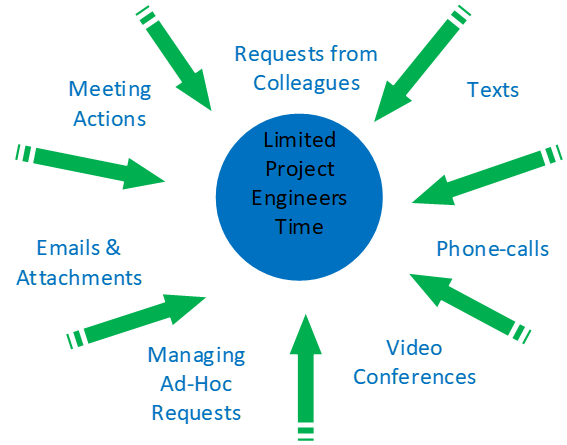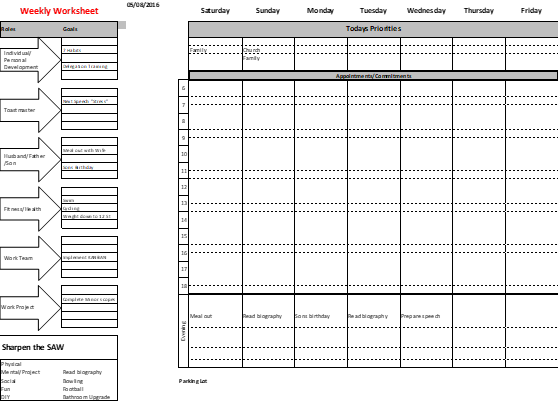Time Management
We have all seen colleagues, clients and even ourselves juggling meetings, replying to e-mails in meetings, and taking urgent calls. In the world of interconnected project communities, it is easy to be accessible at all times. During your career as a Project Engineer you will often hear:
- “I never have enough time!”
- “I am constantly interrupted!”
- “I have to multitask continuously!”
Sounds familiar…Yes? I agree that as a busy Project Engineer, you will probably never have as much time as you wish, but armed with the Time Management Methodology described in this chapter, you will be able to maximise your effectiveness within your available time.

Sure, we are busy, and we like to be seemingly indispensable, but stop and think: Are you truly being effective and efficient?
Managing the "Chaos of Inputs"

One of the key skills to develop as a Project Engineer is effectively managing your time. It is not a case of working harder or longer but working smarter. If you don’t, you will be at risk of failing to deliver and “burnout”.
The inefficiencies of multitasking
Research (Gorlick, 2009) has shown that too much multitasking will actually slow down your cognitive processing. You will be unable to organise your thoughts or filter out unnecessary information. As a result, your efficiency plummets alongside the quality of your work. You are effectively spending your mental energy getting up to speed with an item, only to put it down before you have done any real “work” on it.
Multiplication of effort
As a Project Engineer you will be managing numerous resources. Hence, the better you manage your time, the more comprehensively you can manage and support your teams with a “cascade” improvement effect.
Time Management Techniques
Time Management Methodology
The following section is intended to provide a time mnagent methodology to allow you to incrementally improve your time management skills. As all the tools in this book, you will use the basic tool and shape it to your own specific requirements. The more you practice it, the better you will get. The following simple steps are suggested as a basis to develop your own system. Practice this religiously for six weeks and you will not go back to your old ways. I promise!
Weekly sort out and de-clutter
If your desk and e-mail files are cluttered, your brain will also be cluttered, and your project team will be less clear and focused. I have seen people proudly boasting that they have a thousand e-mails in their inboxes, and their desks are stacked high with paper. They advise that they are too busy with “real work” to organise themselves. In reality, they are just less effective and efficient.
Allocate regular time
Set aside some time every week, preferably the same time, to declutter and plan your time management. I set aside Friday mornings as there are fewer disturbances. This is one of the most important and effective things to do in your working week.
E-mail triage
Work through all your e-mails in your inbox. I call this “E-mail Triage”. Decide what does not require any action or filing and delete them. Decide what needs done by you or a delegate, and add it to your action list. Finally decide what needs to be filed in your structured project filing system and add it in.
Hard copy triage
Repeat the e-mail triage exercise for your paper documents and working files. There will always many documents you can simply recycle.
Action list
You are now ready to generate your project action list(s). You will have a pile of actions, both electronically and physically:
- Identify actions that are urgent and important, and group them as priority one.
- Based on the client and management expectations and demands, prioritise these actions in the order they should be completed.
- Identify actions you must do yourself, and those that you can delegate to others.
- Go back to the priority one items and plan some time in your schedule to complete them.
- Group the delegated items into lists that you will be able to share with the wider members of your team.
What you have now just done is de-cluttered and removed the “noise”. Using our Time Management Methodology you will be feeling less stressed and have a clearer perspective of what is urgent and important, and when it will be achieved. Your wider team also benefits as you will be able to clearly advise actions and priorities.
Batching
Many people continuously juggle activities throughout the day and suffer from multitasking inefficiency. The trick to resolving this issue is batching. Only look at your e-mails twice daily and perform a mini-triage. Do not jump onto each e-mail as it comes into your inbox and feel the need to instantly reply.
If you are dealing with repetitive things like variations/change orders, do them all at the same time since they use the same thought process. Batch all your regular tasks to free up quality time for more value-adding activities.
Weekly Worksheet
Project Engineering/Management can be tough. There will be short durations where 100% effort “sprints” are required. However, your project career is a “marathon,” and you must take care of your prime asset: Yourself.
Most Project Engineers are time-limited and it can be very useful to plan out various aspects of your life and allocate the time each deserves. Set aside time for family, socialising, exercise, hobbies, etc. It is important not to neglect important areas of your life as this will also impact your work performance.
There is an excellent time management methodology template in, “The 7 Habits of Highly Effective People: Powerful Lessons in Personal Change,” by Steven R. Covey, upon which the following template is based. A download of this template is available at www.cranstoneng.com

Like de-cluttering, the preparation of the weekly time management worksheet can be practised and fine-tuned to best effect.
Delegation
Delegation sounds easy but is one of the most challenging skills to develop. Correctly used, it is highly effective in multiplying your effectiveness and freeing up your time.
Meetings
Being correctly prepared for meetings can be a very efficient use of time, and as a Project Engineer you will attend and chair many meetings. Imagine a series 1% improvement in all your projects meetings and the impact that it would have on overall project and organisation.
E-Mails
Incorrectly used, e-mails will waste an incredible amount of time. It is quite common to receive long e-mails and attachment trails copied to everybody, and in which you have to laboriously wade through to understand the real issues. Whenever possible, I much prefer in-person conversations or online meetings (such as with Skype) with visuals. We are designed for speaking to each other with instant feedback. Once information has been communicated, by all means follow-up with a short e-mail of agreements and actions for the record.
Managing Distractions
There will be many times, especially if working in an open plan office, where there are distractions from other colleagues talking, phones ringing, etc. When you have a task that requires lots of focus, consider working from home or finding a quiet room in the office. If it is not possible to do this, headphones with suitable music can help.
Proactive and Reactive
Proactive activities are planned in advance and are more efficient than reactive activities. Try to plan 70% of your weekly available time and keep the remaining 30% for unplanned reactive activities.
Do not try to plan 100% of your schedule as you will always fail due to the emerging reactive items. At the end of each week look back and see how many of the planned activities that you have completed. There will be times when there is simply more reactive activity, but planning ahead as much as you can will always be best.
Mobile Phones and Social Media
Mobile phones are a mixed blessing. You can be contacted at any time via voice, text, and many other systems. I keep my mobile phone at my desk unless I need to call people into meetings, or allow contact by reception, etc. Answering texts and taking calls in a meeting is just bad manners and raises the question of what value you are adding to the meeting if you are not giving it your 100%.If there is something really urgent, which is rare when you effectively manage your time, someone will come to the meeting room and call you out.
You can get Twitter, Facebook and many others feeds. There is an instant endorphin “fix” in reading that text or looking at Facebook, which is why we feel driven to check these platforms often. The downside is that this is wasting valuable company time. Try to ration your looking and responding to social media to once or twice per day in order to increase your productivity.
Time Management Summary
Practice the above time management methodology principles and you will see continual improvement. More importantly you will feel less pressured and you will be more effective.
“In Projects you will normally be able to get more resources, and potentially budget but once a date has passed you can never get that time back. Therefore, spend time wisely.” – Ian McKnight
For further insights I suggest you look at Steven Coveys “The 7 Habits of Highly Effective People”


